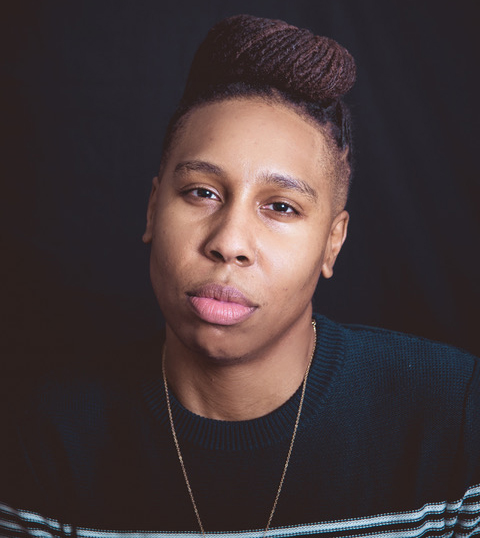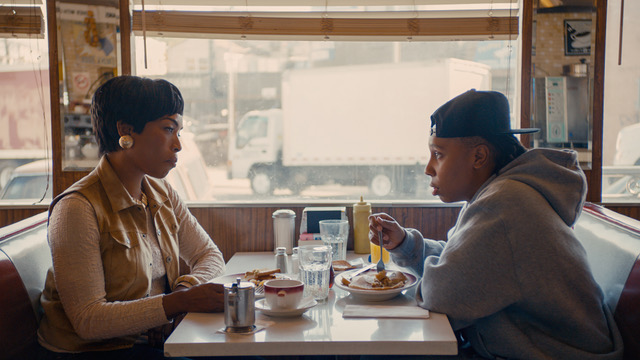
- Industry
Lena Waithe: Making History and Taking the Big Swings
Lena Waithe is so fly and so swaggy. That she also happens to be the first African-American woman to win an Emmy for outstanding writing for a comedy series, which she shared with Aziz Ansari for the Thanksgiving episode of Master of None, based on Lena’s real life when she came out to her family, is payoff for a life of stepping up. Born in Chicago into a matriarchy of strong, black women, she says: “I have always felt like I have every right to walk into any room I have ever walked into.” She states confidently when asked about gender: “Walking into a room full of white dudes from Harvard is nothing compared to what my ancestors had to go through and survive, so for me, this is light work.” “Sometimes people will make you feel like, ‘Oh, just sit over there and be quiet.” She pauses for full effect. “But I have never been good at being quiet or sitting still. I’ve always been someone to work for everything I have, so no one has ever been brave enough to say it to me because I’m not sure what my reaction would be.”

Angela Basset and Lena Waithe on the set of Master of None
Rick Proctor
A self-professed hustler, Waithe grew up watching A Different World and The Cosby Show. “I know (Cosby’s) reputation has been tarnished but if it weren’t for Thursday Nights ‘Must-See-TV’ I wouldn’t be where I am today. It’s like for kids who were born when Barack Obama was president – it was normal for them to have a black man as president. When I was growing up it was normal to see good black movies and good black TV. There was a renaissance going on. That was the time of Spike Lee, John Singleton, and Debbie Allen who helped shape A Different World into what it became. If it weren’t for her, Susan Fales-Hill and Yvette Lee Bowser, the show would not be as iconic as it is. I got to watch my people make great art. Myself and Misha Green, the creator of Underground, were talking, and she said, “Have you ever thought about the fact that you, me, Barry Jenkins, Danny Glover, Justin Simien and Issa Rae are all the same age? We grew up watching similar things.’ I don’t think it’s a coincidence.” Research shows that people look for role models to emulate. By having diversity represented it opens the world of possibilities, and yet people still suggest that in entertainment telling stories of diversity doesn’t do well.
Lena chuckles. “Yeah, we can look at the numbers, (that call out that lie) and still it is framed as a surprise that a movie like Girls Trip does well. When Moonlight wins best picture, when Atlanta wins the Golden Globe for Best Comedy, when I get to take home an award for best writing in comedy for an episode that is a thinly veiled version of my coming out, when that happens, the fact that the misconception still exists is an effort to maintain the status quo. Nobody likes for the paradigm to shift when you are the person benefiting from the paradigm. It’s not just people of color who are wanting to see these stories. People are being exposed to stories that don’t look like everything else. (The audience has) been exposed to the same stories since Birth of a Nation and Nate Parker retold that story. We are in a transitional phase whether people like it or not. The industry is going to have to start to unlearn some of its behaviors and change the way they do business. I don’t think the guys that have power are going to go quietly into the night. We have to find a way to work together because our world is diverse and complex. It is a melting pot of different cultures and people of different sexual orientations and I believe our film and TV should reflect that.”
Waithe is working to make sure that world is represented and she is a triple-threat: acting, writing and producing. When we discuss her new hour-long drama, The Chi, she tells me, “It’s a nickname Chicagoans have given the city. It’s a multi-protagonist story. It’s about what it means to be black and human and on the Southside of Chicago.” Lena also doesn’t back away from inadvertently becoming the poster child for the LGBQTIA community. “I never thought that I had to hide my sexuality or that it would hurt my career. I’ve always been proud of who I am and being gay is part of that.”
This is clearly a great time to be Lena Waithe, but she’s not about to rest on her laurels. “I want to be able to take risks and big swings and try things that feel crazy. I want the freedom to write something bad and not feel the pressure to be amazing because I am the first black woman to ever win an Emmy for writing in a comedy series.”

